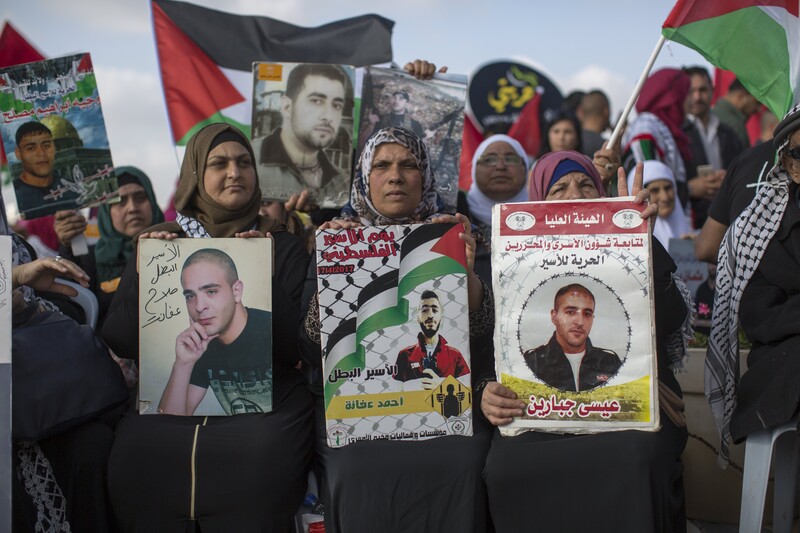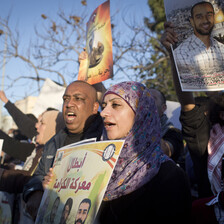The Electronic Intifada 24 May 2017

Palestinian family members hold pictures of relatives in Israeli jails, during a rally in the occupied West Bank city of Ramallah on 3 May, in solidarity with more than 1,300 prisoners who began a hunger strike on 17 April.
EPAOn Friday, 12 May, Sumoud Karajah’s phone rang.
“Jamil Ankoush is fine,” a representative of the International Committee of the Red Cross, ICRC, said on the other end of the line. “He is on hunger strike and sends you his greetings from Shatta prison.”
No additional information was given, no explanation offered, and Sumoud’s desperate need to know more about her fiancé was hardly satisfied. But still, that one sentence was enough to bring the color back to her face. That Jamil, in this stage of his hunger strike, still remembered her number and gave it to the ICRC, meant the world to her.
“At least now I know that he is still alive and I know where he is being held, but also that he is thinking of me,” Sumoud, 29, told The Electronic Intifada. “When the Red Cross representative mentioned that they met Jamil, I shrieked in relief and delight. I think the entire village heard me scream.”
Jamil, from the village of Deir Abu Mishal near Ramallah, was seized on 7 October 2003. Twenty-one at the time, he was sentenced to 20 years in prison by an Israeli military court after being convicted of involvement in armed resistance and affiliation to a proscribed organization, in his case, the Popular Front for the Liberation of Palestine (PFLP).
He has participated in the mass hunger strike from the start on 17 April, according to Sumoud. Some 1,300 Palestinian prisoners are refusing food to demand basic improvements to their prison conditions, including access to public phones, air conditioning and heating and an easing of restrictions on the entry of books, clothing and food brought by relatives.
They are also protesting systematic medical negligence, solitary confinement, reduction in family visits and the common use of administrative detention, the draconian policy under which Palestinians are routinely held without charge or trial by indefinitely renewable military orders.
Cut off from the world
The hunger strike was first called by prisoner leaders of the Fatah political faction, with Fatah’s Marwan Barghouti, serving multiple life sentences, acting as the strike’s focal point.
But prisoners from all the main Palestinian factions are taking part despite divisions and disagreements over the timing and chances of success.
On 4 May, prominent leaders of the prisoners movement, including PFLP Secretary-General Ahmad Saadat, head of the Hamas prisoners leadership committee Abbas al-Sayyid, and Zaid Bseisi, an Islamic Jihad leader, reportedly joined the hunger strike.
The moment prisoners go on hunger strike, they are automatically isolated from the outside world and cut off from any communication, be it with their lawyers or families.
It took a petition to the Israeli high court by Palestinian human rights organizations to pressure the Israel Prison Service into finally allowing lawyers to meet with hunger-striking prisoners.
Former hunger strikers Khader Adnan and Bilal Kayed told The Electronic Intifada that Israel uses a variety of methods to pressure prisoners to drop their hunger strikes.
Among the common tactics are transferring hunger strikers to other prisons or placing them in solitary confinement, in an attempt to cause divisions among strikers.
Barghouti has both been put in solitary confinement and transferred to a new prison during this strike.
Prison authorities also resort to psychological warfare and concerted media campaigns to delegitimize the hunger strikers.
Until that phone call on 12 May, all of Sumoud’s efforts to find even a sliver of information about Jamil had proven fruitless.
“Waiting for news on the hunger striker is like torture,” she said. “You live with your family, you try to remain calm, to go to work, to pretend you are strong, but your heart and mind are elsewhere, in a cell that you don’t know, with the person you love.”
A prison romance
Sumoud and Jamil have never met in person. Sumoud was imprisoned in 2009 after stabbing and slightly wounding an Israeli soldier at the Qalandiya checkpoint.
In his prison cell at Rimon prison, where he was then, Jamil saw the news and tried – and initially failed – to send her a letter in HaSharon prison where she was first held.
“In HaSharon prison you are only allowed to receive letters from your parents so none of his letters reached me,” Sumoud recalled. It was only after she was transferred to Damon prison in June 2010 that his correspondence made it through.
In the very first letter Sumoud received from Jamil he urged her to “stay strong, comrade. I am proud of you.” She did not reply because she did not know him and thought he might be an Israeli spy. Eventually, her brother told her that Jamil was a political prisoner and a fellow PFLP member, and their communication began in earnest.
“Our love was born in those correspondences. At one point, I felt that I was living with him in the same prison. I knew the smallest details about his life and he knew everything about mine,” Sumoud said. “My female comrades were thrilled for me because it was quite rare to witness a love story blossom in prison. They celebrated the arrival of every letter from him almost as much as I did.”
Sumoud was sentenced to 20 years in jail, but was released in October 2011 as part of a prisoner swap between Hamas and Israel in which more than 1,000 Palestinian prisoners were released in exchange for an Israeli soldier captured by Hamas near the Gaza Strip.
In March 2012, Sumoud and Jamil were officially engaged – despite the misgivings of Sumoud’s family, concerned by his long sentence. Although now engaged, Sumoud is still barred from visiting Jamil in prison. He has pleaded with her to end their relationship because he did not want to force her to wait until 2023, the year of his scheduled release, but she is unflinching.
“I am certain that the moment will come and I will hug him and we will be together,” Sumoud said. “But now all I want is for Jamil to stay alive, for the hunger strikers to triumph and to hear his voice.”
But, she added, “I still have no idea what I will do when I see him. I will probably punch him in the face for putting me through all of this.”
Those left outside
Sumoud regularly attends the prisoner solidarity tent in Ramallah, to stand with prisoners’ families and draw strength from them. Mothers, sisters, daughters and partners of hunger strikers have always been at the forefront of the struggle to demand freedom and justice for their loved ones, and this hunger strike is no exception.
But besides leading solidarity actions, women have to fill the void left behind by the long-term imprisonment of their partners and to bear the responsibilities traditionally taken up by men.
When Majd Barbar, Fatimah Barbar’s husband, was imprisoned in 2001, their son, Muntasser, was not yet 2 years old, and Fatimah had only just given birth to their baby girl, Zeina, two weeks earlier. Majd and Fatimah both live in Ras al-Amoud, a neighborhood in the occupied East Jerusalem village of Silwan. They fell in love during the political actions and community events they organized together in Jerusalem.
“Our marriage came from a pretty special love story, but it was all cut short by Majd’s imprisonment,” Fatimah told The Electronic Intifada while looking at his picture. “I knew nothing about his involvement in the armed resistance so his arrest came as a shock.”
Majd worked as an electrician at a hotel in Jerusalem and was arrested at the height of the second intifada. Though he did not confess to any of the charges leveled against him, he was eventually convicted of forming an armed resistance group in Jerusalem and belonging to the PFLP, the left-wing Palestinian movement criminalized by Israel. Majd, then 25, was sentenced to 20 years in prison. Fatimah, then just 23, was forced to raise the kids and make ends meet on her own.
“Raising two babies in the absence of their father is a truly difficult task,” Fatimah said. “I acted as their father, their mother and their friend, and the balance was not always easy to strike.”
Love, family and resistance
Majd’s imprisonment has left an enormous emotional burden on Fatimah, but their love continues to grow, she said.
“Not an hour goes by without me thinking of him,” Fatimah said. “As I speak to you, I imagine the moment of his release. I’ve scripted this moment in my mind on countless occasions, but I know that it will be more beautiful than anything I‘ve imagined.”
Majd has completed both a bachelor’s and master’s degree in prison and was chosen by prisoners to direct the education department in Gilboa prison as well as to help youngsters complete their high school matriculation exams.
“So many former prisoners from Jerusalem visit us after their release and tell us about Majd’s generosity, his support for them, how he changed their lives and encouraged them to resume their education,” Fatimah said. “I cannot help but feel a little envious because many of these prisoners had the chance to live with Majd more than I did. My children see their father through these prisoners’ eyes and stories.”
Zeina, now 16, only has a single photograph with her father, a snapshot taken when, after many failed attempts, the Israel Prison Service finally agreed to allow them to take a photo together without the glass barrier.
Fatimah has worked extremely hard to make up for Majd’s absence, but there are times when the void feels enormous. Last Friday, their son Muntasser, nearly 18, celebrated his graduation from high school. Muntasser asked his mother not to cry during the ceremony and she respected his wish, but Majd’s absence at that moment was “gut-wrenching.”
Majd is also on hunger strike. The news since has been patchy. Fatimah was informed by Majd’s lawyer that, along with all PFLP prisoners in Gilboa prison, he had suspended the hunger strike two weeks after 17 April only to resume it again last week.
“I received contrasting accounts regarding what exactly happened with the hunger strike in Gilboa prison,” Fatimah said. “But regardless, I will continue to participate in solidarity actions with the prisoners and remain close to wives and mothers of hunger strikers. A victory for this hunger strike is a victory for all prisoners, and all Palestinians.”
Budour Youssef Hassan is a Palestinian writer based in Jerusalem. She blogs at budourhassan.wordpress.com.





